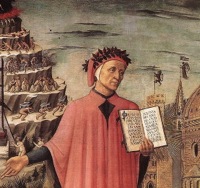Difference between revisions of "Dante Alighieri"
From Nordan Symposia
Jump to navigationJump to searchm (Text replacement - "http://nordan.daynal.org" to "https://nordan.daynal.org") |
m (Text replacement - "http://" to "https://") |
||
| Line 1: | Line 1: | ||
[[File:lighterstill.jpg]][[File:Dante200.jpg|right|frame]] | [[File:lighterstill.jpg]][[File:Dante200.jpg|right|frame]] | ||
| − | ''Durante degli Alighieri'', mononymously referred to as '''Dante'''; 1265–1321), was an Italian [[poet]], [[prose]] [[writer]], literary theorist, moral [[philosopher]], and [[political]] [[thinker]]. He is best known for the monumental [[epic]] poem ''La commedia'', later named ''La divina commedia'' ([ | + | ''Durante degli Alighieri'', mononymously referred to as '''Dante'''; 1265–1321), was an Italian [[poet]], [[prose]] [[writer]], literary theorist, moral [[philosopher]], and [[political]] [[thinker]]. He is best known for the monumental [[epic]] poem ''La commedia'', later named ''La divina commedia'' ([https://en.wikipedia.org/wiki/The_Divine_Comedy The Divine Comedy]). His Divine Comedy, originally called ''Commedia'' and later called ''Divina'' by [https://en.wikipedia.org/wiki/Boccaccio Boccaccio], is considered the greatest literary work [[composed]] in the Italian language and a [[masterpiece]] of world [[literature]]. |
<center>For lessons on the [[topic]] of '''''Dante''''', follow [https://nordan.daynal.org/wiki/index.php?title=Category:Dante '''''this link'''''].</center> | <center>For lessons on the [[topic]] of '''''Dante''''', follow [https://nordan.daynal.org/wiki/index.php?title=Category:Dante '''''this link'''''].</center> | ||
| − | In Italy he is known as ''il Sommo Poeta'' ("the Supreme Poet") or just ''il Poeta''. Dante, [ | + | In Italy he is known as ''il Sommo Poeta'' ("the Supreme Poet") or just ''il Poeta''. Dante, [https://en.wikipedia.org/wiki/Petrarch Petrarch], and [https://en.wikipedia.org/wiki/Boccaccio Boccaccio] are also known as "the three fountains" or "the three crowns". Dante is also called the "Father of the Italian language".[https://en.wikipedia.org/wiki/Dante] |
[[Category: Languages and Literature]] | [[Category: Languages and Literature]] | ||
Latest revision as of 23:40, 12 December 2020
Durante degli Alighieri, mononymously referred to as Dante; 1265–1321), was an Italian poet, prose writer, literary theorist, moral philosopher, and political thinker. He is best known for the monumental epic poem La commedia, later named La divina commedia (The Divine Comedy). His Divine Comedy, originally called Commedia and later called Divina by Boccaccio, is considered the greatest literary work composed in the Italian language and a masterpiece of world literature.
In Italy he is known as il Sommo Poeta ("the Supreme Poet") or just il Poeta. Dante, Petrarch, and Boccaccio are also known as "the three fountains" or "the three crowns". Dante is also called the "Father of the Italian language".[1]
